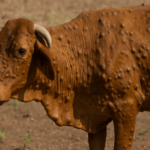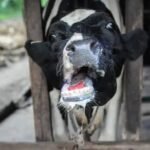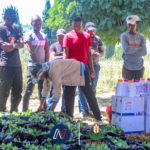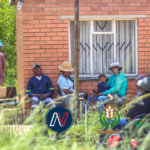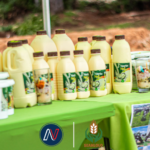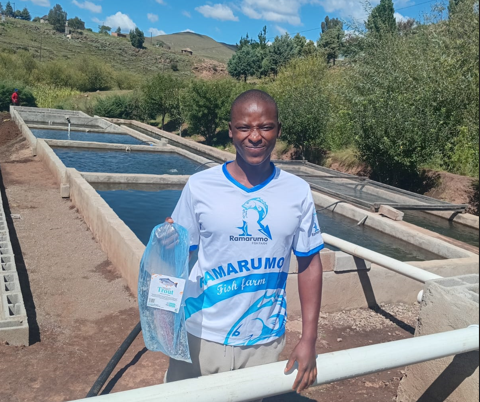Topollo Tlali and Lerato Matheka
In the steep, sun-scorched valleys of Liphokoaneng in Thaba-Tseka, where boys are more likely to become herdboys than businessmen, and where childhood is often shaped by the weight of survival rather than dreams, one young man is rewriting that narrative, one trout at a time.
At just 25 years old, Khaolo Ramarumo, affectionately known as “Farm Boy,” has turned what was once a desperate struggle to put food on the table into a thriving aquaculture venture that now serves as a beacon of hope for his family, his village, and the broader highlands of Lesotho.
His is not just a story of entrepreneurship, but a story of defying the odds in a country where poverty grips tightly, opportunities are scarce and unemployment is at its peak.
The poverty that drove many boys to herd sheep drove Khaolo toward water.
“I grew up fishing to help at home and I was my prime priority. If I didn’t, there would not be food,” Khaolo recalls.
The fish he caught weren’t for sport or hobby, they were survival. They meant dinner, school fees, clothes and sometimes, a few coins saved for a future he wasn’t sure would ever arrive.
Clutched by poverty, and faced with the responsibility of fishing, the cold rivers of Thaba-Tseka turned into his classroom and the fish his only textbooks until that reality affected his journey of formal education.
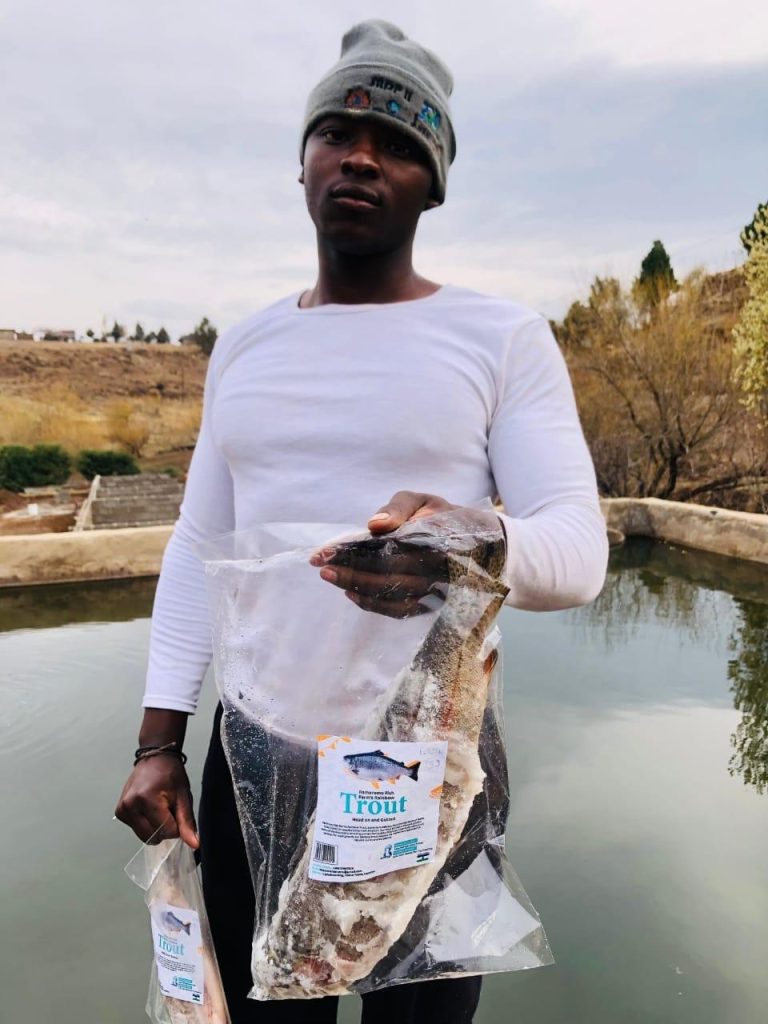
“I ended up failing Form D because of fishing,” he admits. He says he somehow envisioned that his destiny swam in those cold streams and rivers.
Where others saw isolation and hardship, he saw possibility. He recounts that every time he peered into the Maliba-Matso River and saw thousands of tiny fingerlings gliding beneath the surface, he asked himself, “What if I could grow these fish—not just catch them? What if I could build a future from this?” and just like that a dream was birthed.
In 2019, with nothing but this dream and the support of his father who remembered how fish once kept the family from starvation, Khaolo gave up formal schooling altogether and registered Ramarumo Fish Farm Pty Ltd.
Using the family, they laid the foundation. The money they used was scraped together.
No big investors, no community support, just a son and a father, digging ponds and believing in something no one else could see.
Today, Ramarumo Fish Farm is changing the face of fish farming in Lesotho and positioning the impoverished Thaba-Tseka as the hub district that houses a farm produces thousands of sought after royal rainbow trout each year in a series of raceway ponds.
His farm draws clean water from a nearby river in a sophisticated network that allows communities downstream to still have access to the water.
With the complications that comes with getting aquaculture right, access to water is at the top of it, he says, explaining that the river he uses has helped sustain this business.
“This system allows me to harvest and release the water for the farm. The harvested water is treated before it is used in the ponds and treated again before it is released downstream. It is an almost automated system which I build overtime.”
He started with just 200 fish annually.
Today, the farm can raise up to 10,000.
“Dreams do come true when one puts in the work and believes,” he says.
The turning point he reveals came when he partnered with the Smallholder Agriculture Development Project II (SADP), which offered him a grant that allowed for the construction of two more ponds and provided fish feed.
“That was the motivation I needed. Someone to believe I was on to something good. The money came in handy and was truly the correct motivation.”
He is now aiming to scale up production to 30,000 fish annually and dreams of exporting his trout beyond Thaba-Tseka, Leribe and Maseru.
“With the support of Basotho businesses, this product can definitely be the country pride on continental and global markets,” he challenged.
Fish farming is not an easy business by virtue of its novelty and the challenges are many.
“Feeding alone makes up 80% of the production costs and the biggest challenge is they must be imported from South Africa.
“There is a need of what may look like around the clock nurturing because the fish must be fed several times a day,” he explains.
Like other food production commodities, aquaculture is prone to climate change stresses.
“Climate change has drastically altered the environment and temperatures. Once comfortably cool water of the highlands can soar beyond 30°C in the summer, threatening fish survival. This has forced me to seek more technological answers to sustain,” he says.
When mass fish deaths once devastated his entire stock, it was his 76-year-old father who consoled him with words that still echo in his ears, “Take that failure as a lesson, as your school fees in the farming world.”
“I had lost a lot of fish due to the changed temperatures as well as lack of adequate production knowledge,” he says quietly, recalling nights of weeping beside dead fish in the ponds, mourning lost profits.
“It felt like the end of the road when the loss was quantified in monetary terms, but as the advice from my father, each loss became a lesson. I now know that in farming of any commodity one cannot say they know it all. I immense in knowledge, I read, I learn, I rearrange, I modify every day.”
Seeing that his business idea and model is an investable one, he became a relentless student of the business, using the internet to learn things he can otherwise cant learn in Lesotho.
He went further to taking a shot at the SEBABATSO pitch competition where selected.
Through the program, he travelled to China for aquaculture business training.
“I learned what is defining my production. The program covered global production techniques and marketing strategies as well as technologies. I gained valuable insights into breed quality and fish health, all skills I brought back home with pride.”
He further trained under the department of Fisheries in the Ministry of Forestry where he learned formulate his own fish feed, tailored to local conditions. The result? Rainbow trout so vibrant, they are snapped up within hours.
Now, Ramarumo Fish Farm not only provides nutritious food to local households, it also employs three permanent workers and several seasonal ones, including women who harvest, clean and sell the fish.
“Wastewater and fish faeces are used in vegetable farming to help create a circular system that feeds the land as much as it feeds people,” he says.
His fish, rich in colour and carefully bred, weighs up to one kilogram in six months.
“I sell them as per request, alive, fresh or processed and where I am now, the demand exceeds supply with most fish sold within hours of harvest.”
“There are no contracts yet. I sell directly to consumers and companies.”
Sharing his financial gains, Khaola says revenue from just one cycle of 5,000 fish can bring in M350,000. Even after costs, he clears up to M250,000, a sum that is reinvested into more ponds, more feed, and bigger dreams.
Ramarumo Fish Farm is more than a business. It is a movement where Khaolo mentors youth and advocates for local production.
He champions Lesotho’s Blue Economy. He tells anyone who will listen about the country’s potential.
He is now part of national policy conversations. He has represented Lesotho at Youth Connekt Africa in Rwanda.
He dreams of building a nationwide fish farming network.
He sees women, too, playing a major role, but warns that climate shifts and technology will require serious adaptation.
Despite all the attention, Khaolo remains grounded. His proudest moment was seeing his trout served at a hotel, perfectly plated. “The plate came back empty,” he smiles.
Khaolo’s work has not gone unnoticed. He met the Prime Minister during an agricultural show in Thaba-Tseka—an encounter that reaffirmed the impact of his work and made him believe even more in the future of aquaculture in Lesotho.
He’s now part of Lesotho’s Blue Economy strategy team, helping to craft national aquaculture policy and his involvement speaks to the broader potential of fish farming in tackling youth unemployment, food insecurity, and poverty in remote areas like his.
“To the youth, stop waiting for jobs. Use the water, the soil, the air and everything Lesotho gives you for free. We have all the tools to create our own solutions, what we need to dream a little and believe,” he says.
With a deep sense of spiritual vision, Khaolo sees Lesotho as a nation of latent power, waiting to wake up.
“If 10 of us make this happen, in 10 years, hundreds will join. Lesotho can be a fish nation feeding bigger markets.”

